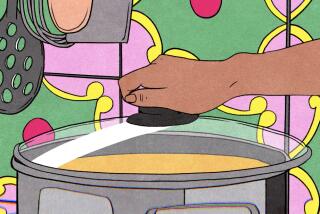Oscar Hijuelos dies at 62; Pulitzer Prize-winning novelist
- Share via
Oscar Hijuelos, a son of Cuban immigrants to the U.S. whose 1989 novel “The Mambo Kings Play Songs of Love” made him the first Latino to win the Pulitzer Prize for fiction, has died. He was 62.
His death was confirmed by a spokesman for Gotham Books, which published Hijuelos’ 2011 memoir “Thoughts Without Cigarettes.”
Hijuelos had a heart attack Saturday on a Manhattan tennis court, his agent, Jennifer Lyons, told the Associated Press.
Though his success helped pave the way for other Latino writers, he never felt comfortable with an ethnic label.
“I basically do my own thing,” he told Newsday in 1999. “I quietly write novels.”
“The Mambo Kings Play Songs of Love,” his second book, had a reception that was anything but quiet.
“It was a masterpiece,” novelist Francine Prose told the Los Angeles Times on Sunday, recalling her exhilaration as an editor read her a snippet on the phone. “It was so beautiful and unlike anything I’d heard before.”
Despite Hijuelos’ trepidation about being pigeonholed, it also sent an encouraging message to a generation of young Latino writers, she said: “Your experience is important, and your stories are worth telling.”
The novel, which revolves around a pair of Cuban brothers who start an orchestra in New York, won the Pulitzer in 1990 and was made into a 1992 movie, “The Mambo Kings,” with Armand Assante and Antonio Banderas.
The brothers manage to hit the big time, appearing on the popular TV comedy “I Love Lucy,” co-starring bandleader Desi Arnaz, the very image of Cuban American success.
However, the brothers’ fame quickly fades, and Hijuelos poignantly illustrates the limits of their dream.
It’s “another kind of American story,” wrote New York Times critic Michiko Kakutani, “an immigrant story of lost opportunities and squandered hopes.”
Born in New York City on Aug. 24, 1951, Hijuelos grew up in the bustling, multi-ethnic neighborhood of Morningside Heights. Immigrants from Holguin in eastern Cuba, his father, Pascual, found kitchen work in a Manhattan hotel, and his mother, Magdalena, raised the children and wrote poetry.
On a summer trip to Cuba, 4-year-old Oscar contracted nephritis and, on his return to New York, was sent to a convalescent hospital in Connecticut for a year.
He might as well have been in exile.
“It was during that long separation from my family that I became estranged from the Spanish language and, therefore, my roots,” he wrote in a 2011 essay in the New York Times.
Hijuelos’ feeling of dislocation lasted for years.
“I always felt shell-shocked growing up,” he told NPR.
Hijuelos attended Bronx Community College and City College of New York, where he was mentored by a number of seasoned writers, including short story master Donald Barthelme.
After receiving his master’s degree in 1976, he worked in advertising for seven years as he honed his literary craft on the side, exploring the psychic limbo of immigrants torn between their old and new homes.
It was painstaking work.
Juan Felipe Herrera, who was named California’s poet laureate in 2012, said he was “floored” when he heard Hijuelos in New York speak of fleshing out each of his many characters with 100 or so pages, “digging into their life, their physicality — defining what they eat, their thoughts and their dreams.”
“I marveled at how hard he worked,” Herrera said, “how meticulous he was and how deep he got into the lives of Latino and Cuban Americans in the United States....”
His first novel, “Our House in the Last World,” sold modestly but was widely praised. The Chicago Tribune called Hijuelos’ style “elegantly accessible,” combining “innocence and insight.”
Hijuelos wrote eight novels, including “Empress of the Splendid Season,” “Dark Dude” and a Mambo Kings sequel, “Beautiful Maria of My Soul.”
He is survived by his wife, Lori Marie Carlson.
More to Read
Sign up for Essential California
The most important California stories and recommendations in your inbox every morning.
You may occasionally receive promotional content from the Los Angeles Times.















